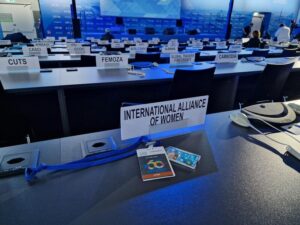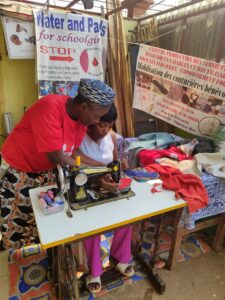 The Violence Against Women Observatory met in Brussels on 13-14 November, with an additional meeting on Refugee women and violence on 15-16 November. Women from all EU countries attended, together with women from Norway and European Networks. The principal aim was to action the Istanbul Convention on Violence Against Women, and countries were asked to advise on ‘where is your country’ – signed, ratified, swinging into action, as well as reporting on the position of their respective organisations. We brainstormed ideas for campaigning and taking imaginative actions in Brussels and around the EU, in every country and as many capitals and centres as possible, making women’s commitment to the Istanbul Convention clear, and demanding our countries and the EU as a whole honour its principles and the practices necessary to implement the Convention fully.
The Violence Against Women Observatory met in Brussels on 13-14 November, with an additional meeting on Refugee women and violence on 15-16 November. Women from all EU countries attended, together with women from Norway and European Networks. The principal aim was to action the Istanbul Convention on Violence Against Women, and countries were asked to advise on ‘where is your country’ – signed, ratified, swinging into action, as well as reporting on the position of their respective organisations. We brainstormed ideas for campaigning and taking imaginative actions in Brussels and around the EU, in every country and as many capitals and centres as possible, making women’s commitment to the Istanbul Convention clear, and demanding our countries and the EU as a whole honour its principles and the practices necessary to implement the Convention fully.
Background
Established in 1997, following the 1995 Beijing Declaration and Platform for Action highlighting states’ commitment to taking action for ending Violence Against Women, the EWL Observatory consists of professionals, human rights defenders and NGO activists. The Observatory aims to keep Violence Against Women high on EU states’ agendas, acting as a ‘watchdog’ of policy and practice developments and developing innovative approaches whilst keeping the scourge of Violence Against Women visible. Through visibility and action, the Observatory aims to ensure that the reality ‘on the ground’ of Violence Against Women cannot be forgotten or hidden from view. This work has ensured that the Observatory is influential at European and national level.
Observatory November 2016
An introduction session saw each participant provide a brief biography, including reference to ‘most admired feminists’ … I listed Elizabeth Cady Stanton, Matilda Joslyn Gage and my grandmother, Maud Helen McIlroy Needham … whilst others referred to women from their own countries, writers, activists, historical figures, politicians … We then had a discussion on the purpose of the meeting – principally the Istanbul Convention, its content, its (potential) impact, and action being taken at present to ensure its ratification and implementation.
We moved into workshops on the media – including social media – and violence against women, culture and tradition underpinning violence against women, rape and other sexual offences (including marital rape), sexual harassment, and the role of the justice system.
Plenary sessions included feedback from the various groups, and reports from each participant on the greatest impediments confronting women and the will toward ending violence against women. For the United Kingdom, (lack of) access to justice is a principal problem – cut backs to legal aid make it difficult for women to gain justice at myriad levels, including in family law (custody/residency, access/visitation, and property rights, as well as employment issues. Discrimination, sexual and sexist harassment (including bullying) are difficult to pursue – employment tribunals cost money, with a lodging fee necessary before a case can be commenced. There are problems, too, with the way tribunals and judges (fail to) ‘see’ these forms of violence against women: too often, still, sexual and sexist harassment are classed as ‘banter’ (joking) by decision-makers.
Conclusion
The brainstorming session for actions in 2017 to advance the Istanbul Convention including proposals for demonstrating in Brussels at the European Parliament and the Commission; holding ‘sister’ demonstrations throughout the EU; ensuring that at a particular time, on one day throughout the EU women engage in some action – suiting the style and content of the action to what they see as most pressing in their country and community. The Observatory resolved to establish a small working party to develop these ideas and to return to participants and organisations with a proposal, so that everyone can work together toward the goal of highlighting the importance of the Istanbul Convention and the vital need for its ratification so that positive, pragmatic and principled actin can and will be taken – by all states.
JAS © December 2016



